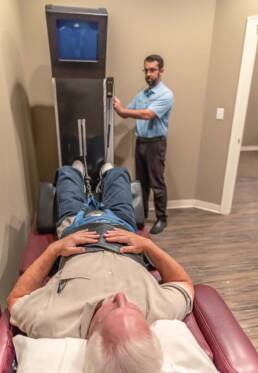Herniated discs and sciatica pain are conditions that can significantly impact an individual’s daily life. They are characterized by persistent discomfort and can limit mobility. Freedom Chiropractic, located in Conroe, TX, recognizes the crucial role that targeted chiropractic care plays in alleviating these conditions. Let’s take a closer look at what herniated discs and sciatica pain entail and how our chiropractic services can make a difference in your life.
Understanding Herniated Discs
Herniated discs, sometimes referred to as slipped or bulging discs, occur when the soft inner core of a spinal disc pushes through the tough outer layer. The causes of herniated discs can vary and may include factors such as aging, sudden injury, or repetitive stress. When a herniated disc presses against a nerve root, it can result in a range of symptoms, including intense localized pain, tingling sensations, and numbness. This condition often has a direct impact on sciatica pain, which we’ll explore in the next section.
Sciatica Pain: A Common Symptom
Sciatica pain is a prevalent and often debilitating condition that affects countless individuals. Understanding its causes, symptoms, and the relationship with herniated discs is crucial for effective treatment and pain management.
Definition and Causes of Sciatica Pain
Sciatica pain is a term used to describe pain that radiates along the path of the sciatic nerve, which is the longest nerve in the human body. This nerve runs from the lower back, through the buttocks, and down each leg. When something compresses or irritates the sciatic nerve, it can result in pain, numbness, tingling, or weakness in the lower back and leg.
Common causes of sciatica pain include:
- Herniated Discs: As discussed earlier, one of the most common causes of sciatica pain is a herniated disc. When the inner gel-like substance of a spinal disc protrudes and compresses the sciatic nerve, it triggers sciatica symptoms.
- Spinal Stenosis: This condition occurs when the spinal canal narrows, putting pressure on the nerves, including the sciatic nerve. It often develops with age and can cause sciatica pain.
- Piriformis Syndrome: The piriformis muscle, located in the buttocks, can sometimes irritate or compress the sciatic nerve. This condition is known as piriformis syndrome and can mimic the symptoms of sciatica.
- Spondylolisthesis: When one vertebra slips forward over another, it can narrow the spinal canal and lead to sciatica pain.
- Spinal Tumors or Infections: Rarely, tumors or infections in the spine can affect the sciatic nerve and result in sciatica symptoms.
Relationship between Herniated Discs and Sciatica
Herniated discs are intimately linked with sciatica pain. The discs act as cushions between the vertebrae, and when one of them herniates, it can press against the sciatic nerve roots that extend from the spinal cord. This pressure leads to the characteristic radiating pain, numbness, or tingling sensations that are associated with sciatica.
Typical Symptoms Experienced
Sciatica pain can vary in intensity and presentation, but some typical symptoms include:
- Radiating Pain: A sharp, shooting pain that travels from the lower back, through the buttocks, and down one leg. The pain can range from mild to excruciating.
- Numbness and Tingling: Many individuals with sciatica experience numbness and tingling sensations along the path of the affected nerve.
- Muscle Weakness: Weakness in the leg or foot on the affected side can occur, making it challenging to walk or perform daily activities.
- Burning Sensation: Some describe sciatica pain as a burning or searing sensation in the affected leg.
- Worsened Symptoms with Movement: Certain movements, such as bending or sitting for extended periods, can exacerbate sciatica pain.
- Difficulty with Balance: Severe sciatica pain can affect balance and coordination.
Understanding these symptoms and their association with herniated discs is essential when seeking treatment. Chiropractic care, as provided at Freedom Chiropractic, aims to address the root cause of sciatica pain by gently realigning the spine and relieving pressure on the affected nerve, ultimately alleviating these distressing symptoms.
By acknowledging the relationship between herniated discs and sciatica pain and recognizing the typical symptoms, individuals can take proactive steps toward seeking the appropriate treatment and finding relief through targeted chiropractic care.
Chiropractic Care for Herniated Discs and Sciatica Pain
Chiropractic care is a non-invasive and highly effective approach to treating herniated discs and relieving sciatica pain. This specialized form of healthcare focuses on the spine and musculoskeletal system, aiming to correct misalignments and promote natural healing.
Non-Invasive Approach
One of the primary advantages of chiropractic care is that it provides a non-invasive alternative to more aggressive treatments like surgery or prolonged medication use. Chiropractors use manual techniques to realign the spine and alleviate pressure on affected nerves, offering relief from pain and discomfort.
How Chiropractic Adjustments Work
Central to chiropractic care is the chiropractic adjustment, also known as spinal manipulation. Chiropractors use their hands or specialized instruments to apply controlled and precise force to specific areas of the spine that are misaligned or subluxated (out of proper position). These adjustments have several key effects:
- Restoring Alignment: Adjustments help restore proper alignment to the spine, which is essential for the optimal functioning of the nervous system.
- Relieving Pressure: By realigning the spine, chiropractic adjustments alleviate pressure on nerves that may be compressed or irritated by herniated discs or other spinal issues.
- Reducing Inflammation: Chiropractic care can help reduce inflammation in the affected area, contributing to pain relief and improved mobility.
- Promoting Natural Healing: Adjustments stimulate the body’s natural healing processes. When the spine is in proper alignment, the body is better equipped to heal itself.
Customized Treatment Plans
Chiropractors understand that each patient’s condition is unique. Therefore, they develop customized treatment plans tailored to the individual’s specific needs and the severity of their herniated disc and sciatica pain. These treatment plans may include a series of adjustments scheduled over a defined period.
Holistic Approach
Chiropractic care takes a holistic approach to healthcare, emphasizing the interplay between the spine and the entire body. Chiropractors often provide advice on lifestyle modifications, including exercises to strengthen core muscles, improve posture, and enhance overall well-being. They may also offer guidance on nutrition, stress management, and ergonomics, all of which can influence spinal health.
Patient-Centered Care
Chiropractors prioritize patient-centered care. They listen to patients’ concerns, thoroughly assess their condition, and collaborate with them to develop treatment plans that align with their goals and preferences. This patient-centered approach fosters a sense of partnership between the patient and the chiropractor in the journey toward better health.
Monitoring Progress
Throughout the course of treatment, chiropractors monitor a patient’s progress closely. Adjustments to the treatment plan can be made based on how the patient responds, ensuring that the care remains effective and aligned with the patient’s goals for pain relief and improved function.
Chiropractic care at Freedom Chiropractic in Conroe, TX, offers a natural and effective path to relief from herniated discs and sciatica pain. By addressing the root causes of these conditions through spinal adjustments and promoting overall spinal health, chiropractors help patients regain their quality of life and reduce their dependence on medications or invasive procedures. The personalized and holistic approach of chiropractic care makes it an excellent choice for those seeking long-term relief and improved well-being.
Benefits of Targeted Chiropractic Care
- Pain Relief and Improved Mobility: Chiropractic care focuses on pain relief and enhanced mobility. By reducing inflammation and promoting proper spinal alignment, patients often experience significant pain reduction and increased freedom of movement.
- Avoiding Surgery and Medications: One of the significant advantages of chiropractic care is that it offers a non-invasive alternative to surgery and medication. Many patients prefer this approach as it reduces the risk of potential side effects and complications associated with more invasive treatments.
- Enhancing Overall Spine Health: Beyond symptom relief, chiropractic care promotes overall spine health. Regular adjustments not only address the immediate issue but also work to prevent future problems. This proactive approach is essential for long-term well-being.
Prevention and Maintenance
Preventing future issues and maintaining spinal health are crucial aspects of managing herniated discs and sciatica pain. While targeted chiropractic care can provide effective relief, adopting a proactive approach to your overall well-being can significantly reduce the risk of recurrence and enhance your quality of life.
Lifestyle Adjustments for Prevention
- Maintaining a Healthy Weight: Excess weight places additional stress on your spine, particularly in the lumbar region. By maintaining a healthy weight through a balanced diet and regular exercise, you can reduce the strain on your spinal discs and nerves.
- Practicing Good Posture: Proper posture is essential in preventing spinal problems. Whether you’re sitting at a desk, standing, or lifting heavy objects, maintaining good posture helps distribute the load on your spine evenly. Ergonomic furniture and workspace setups can also contribute to better posture.
- Staying Active: Regular physical activity is a cornerstone of spine health. Engaging in exercises that strengthen the core muscles, such as yoga or targeted strength training, helps support your spine’s stability and reduces the risk of injuries.
- Avoiding Smoking: Smoking has been linked to decreased blood flow to spinal discs, potentially increasing the risk of disc degeneration. Quitting smoking can be a vital step in maintaining spinal health.
Our chiropractors specialize in targeted chiropractic care, a non-invasive approach that can effectively address the root causes of your discomfort. Through precise spinal adjustments, we can gently realign your spine, alleviating the pressure on affected nerves and discs. What sets us apart is our commitment to personalized care – your treatment plan is tailored to your unique condition and needs.
Your Journey Starts Today
Your journey toward a pain-free, active life begins with Freedom Chiropractic. Don’t let pain hold you back any longer. Contact us today and take that crucial first step. We’re here to guide you, support you, and provide the relief you deserve. Your well-being is our priority, and we look forward to helping you reclaim your freedom from pain.

Ready for a complimentary consultation? Get in touch today!
Much like an engineer, we focus on setting up your body to do the activities that you want to do most. An engineer would make sure a bridge could accommodate Houston traffic, and we will make sure your body can accommodate your favorite sport, family activity, or your next adventure.
Like this article? Spread the word!
Related Posts
July 15, 2024
Enhancing Your Health Naturally: How Freedom Chiropractic in Conroe, TX Can Help
Experience the power of natural healing at Freedom Chiropractic in Conroe, TX. Our…
June 19, 2024
Discover Freedom Chiropractic: Your Path to Wellness in Conroe, TX
Discover Freedom Chiropractic in Conroe, TX, where Dr. Tony Brooks and our team offer…
May 15, 2024
Unlocking Wellness: The Comprehensive Guide to Chiropractic Care in Conroe, TX
Discover comprehensive chiropractic care in Conroe, TX at Freedom Chiropractic. Our…




